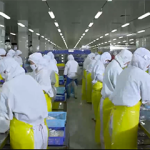Environmental groups sue Washington state to slow Cooke's shift to farming steelhead

A group of conservation and environmental groups filed a lawsuit on Tuesday, 11 February, against the Washington State Department of Fish and Wildlife, citing the department’s decision to allow Canada-based Cooke Aquaculture to farm steelhead trout at its former Atlantic salmon farm sites.
Last month, the Washington Department of Fish and wildlife approved a five-year permit for Cooke to farm steelhead in Puget Sound and the Salish Sea. In March 2018, the Washington state legislature voted to phase out the farming of non-native finfish after at least 300,000 Atlantic salmon escaped from a Cooke farm near Cypress Island the previous year.
Cooke decided to convert its existing farms to steelhead, a native species that meets the state’s limitations for finfish aquaculture. Additionally, it will farm only females, most of which will be non-fertile.
The lawsuit, which was filed by several environmental non-governmental organizations, claims the state’s Department of Fish and Wildlife is allowing the use of steelhead feed lots without consideration of what effect they will have on the water quality of Puget Sound and the wild species that live there such as the salmon fishery and orca whales.
The lawsuit argues that the state used “an analysis from 1990, before Puget Sound steelhead, killer whales, and salmon species were listed as threatened or endangered.”
“It’s outrageous that once again the state is leaving the oversight of this industry to the public,” Wild Fish Conservancy Executive Director Kurt Beardslee said. “After the Cypress net-pen collapsed, our research discovered that nearly every fish that escaped was infected with a pathogenic exotic salmon virus that had been undetected by WDFW and unreported by Cooke. Our litigation has won settlements many times larger than the penalties levied by the state, and the state has left it to us and the pens’ neighbors to detect serious problems. Given this history, it is beyond comprehension that WDFW would grant this permit without first completing a comprehensive assessment of its effects on our salmon, [Puget] Sound, and our killer whales.”
The groups are being represented by Kampmeier & Knutsen, PLLC as well as lawyers from the Center for Food Safety and Center for Biological Diversity.
The Northwest Aquaculture Alliance (NWAA), a trade group representing local aquaculture firms in the Pacific Northwest, criticized the lawsuit.
“We regard this lawsuit as a desperate, last-ditch effort to delay a project that the Washington Department of Fish and Wildlife (WDFW) approved after a year of intensive scientific review and public input," NWAA Executive Director Jeanne McKnight said in a statement. "While the intent of this frivolous lawsuit is to delay the project and harm the two companies involved in the joint venture, we believe this legal action will also do major harm to the people of this region who desperately need jobs and seafood they can afford."
McKnight said her organization has "complete confidence in the process that the state went through before permitting this project."
“The scientists and regulators at WDFW who are in charge of aquaculture permitting are well-qualified to make the decision they made in January to permit this important project. It is unfortunate that the self-styled 'friends' of Puget Sound have demonstrated that they place ideology over sound science. These groups are holding Washington back from the growth in aquaculture that is taking place elsewhere in the United States and around the world. The rest of the world has recognized the role aquaculture plays in providing nutritious, responsibly produced seafood that people can afford.”
Cooke Aquaculture Pacific and the Jamestown S’Klallam Tribe will only raise sterile rainbow trout at their Washington farms, complying with the the state's conditions for responsible marine farming, which are contingent on Cooke complying with strict provisions designed to minimize risk to native fish populations, McKnight said.
“In our view, WDFW was well within its legislative authority to approve Cooke’s five-year permit after conducting a review under the State Environmental Policy Act (SEPA),” McKnight said.
Photo courtesy of CSNafzger/Shutterstock






Share